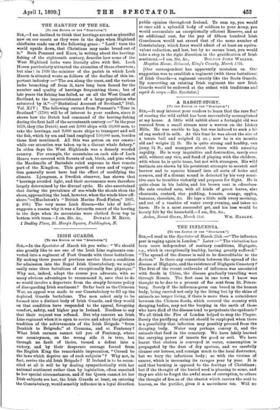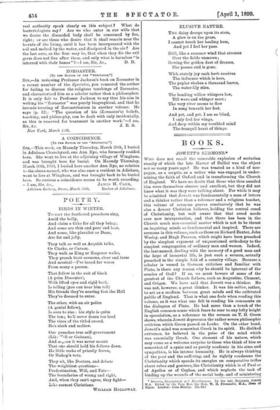THE INFLUENZA.
[TO THE EDITOR OF THE " SPECTATOR:1
Sin,—I read in the Spectator of March 25th :—" The influenza pest is raging again in London." Later :—" The visitation has been more independent of sanitary conditions, Highgate, e.g., which is exceptionally healthy, having greatly suffered." " The spread of the disease is said to be discreditable to the doctors." Is there any connection between the spread of the disease at Highgate, and the existence of Highgate Cemetery ? The first of the recent outbreaks of influenza was associated with floods in China, the disease gradually travelling west through Russia. The first case in one town I know was thought to be due to a present of far sent from St. Peters- burg. Surely if the influenza-germ can breed in the human body, being carried not only by the living but by the skins of animals no longer living, if there is more than a coincidence between the Chinese floods, which covered the country with decaying bodies, may not the burying in the earth of those who have died of the disease tend to perpetuate the epidemic P We all think the Fire of London helped to stop the Plague. Surely the purifying element should be employed when there is a possibility that infection may possibly proceed from the decaying body. Water may perhaps convey it, and the animals that feed in the cemetery. We have lately learned the carrying power of insects for good or evil. We have learnt that cholera is conveyed in water, consumption is propagated by the dust of dry sputum, and we carefully cleanse our houses, and consign much to the local destructor, but we bury the infectious body ; so with the victims of cancer, which is increasing its ravages year by year. It is said that burning is opposed to the feelings of Christians ; but if the thought of the buried seed is pleasing to some, and they are able to forget the awful mass of corruption, to others the thought of fire as of the chariot which carries the soul to heaven, as the purifier, gives it a sacredness too. Will no
real authority speak clearly on this subject P What do bacteriologists say ? Are we who enter in our wills that we desire the discarded body shall be consumed by fire, right ; or are those who desire that it shall remain near the haunts of the living, until it has been incorporated with the soil and melted by the water, and dissipated in the air ? Are the last sure, as the first may be, that when they die the evil germ does not live after them, and only what is harmless "is interred with their bones " P—I am, Sir, ac., D. B.







































 Previous page
Previous page